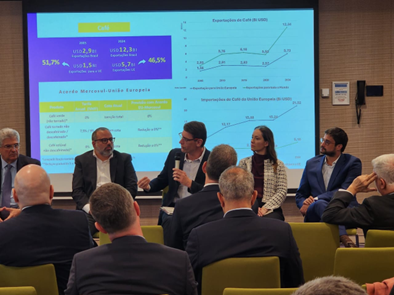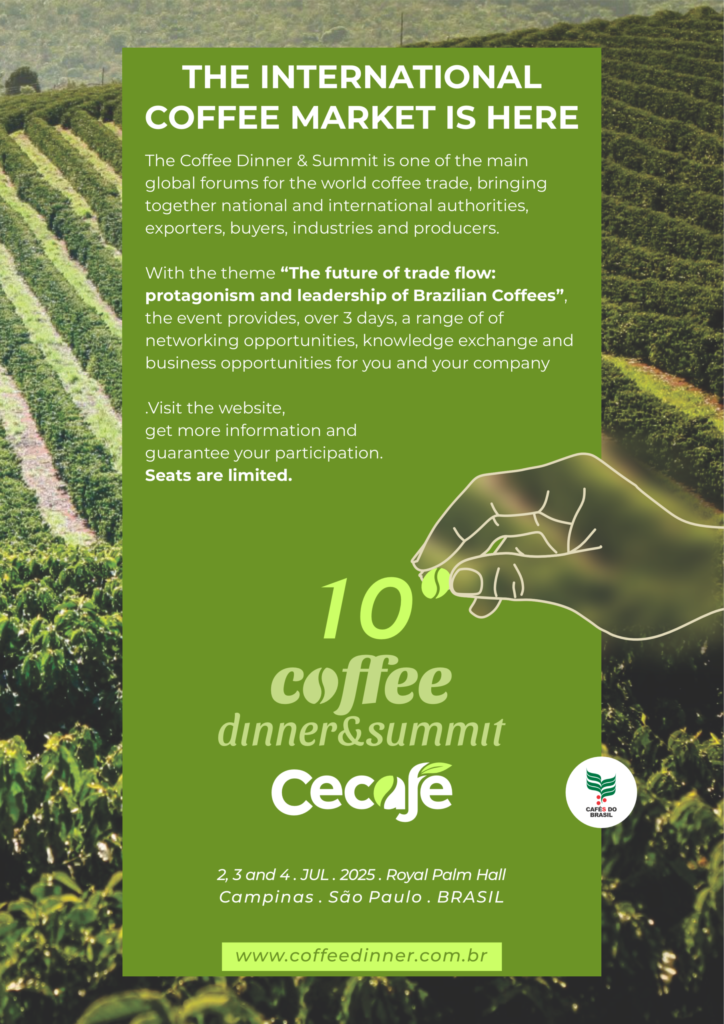Cecafé Strengthens Engagement with European Authorities, Deepening Understanding of New EUDR Proposals and the Country Risk Classification Process
Amid a turbulent geopolitical landscape marked by conflicts and international tensions, the European Union (EU) is focused on simplifying regulations related to environmental, social, and governance (ESG) practices. The aim is to safeguard the global competitiveness of companies within the bloc while upholding the core goals of the European Green Deal.
The process began on February 26 with the publication of the Omnibus proposal, which introduced amendments to EU delegated regulations on the disclosure of information under the environmental, climate, and green taxonomy frameworks. These changes relate to the Corporate Sustainability Reporting Directive (CSRD), the Carbon Border Adjustment Mechanism (CBAM), and the Corporate Sustainability Due Diligence Directive (CS3D).
The first part of the Omnibus proposal took effect on April 17 with the enactment of the “Stop the Clock” directive, which effectively pauses the countdown for implementing certain obligations set out in the CSRD and CS3D, giving companies additional time to comply.
In the case of the CS3D—which carries greater implications for the coffee sector—EU Member States now have until July 26, 2027, to align their national legislation with the directive’s requirements. This extension directly impacts the amendments the German government will make to its Supply Chain Due Diligence Act (LkSG), which affects Brazil’s coffee export chain to Germany.
Still regarding the CS3D, the initial implementation phase for companies falling within its scope has been postponed by one year—from July 26, 2027, to July 26, 2028—as shown in Table 1. The measure is intended to give companies additional time to implement
due diligence systems for environmental and human rights risks, helping to avoid immediate penalties.
TABLE 1: REVISED CS3D IMPLEMENTATION TIMELINE FOR IN-SCOPE COMPANIES FOLLOWING THE ADOPTION OF THE “STOP THE CLOCK” DIRECTIVE

The second part of the Omnibus proposal is still under discussion in the European Parliament. It introduces further changes to the CS3D, including measures to reduce administrative burdens and harmonize codes of conduct, aiming to ensure greater consistency
in how Member States transpose the directive into national law.
Also in April, the European Commission introduced a set of measures aimed at simplifying the European Union Regulation on Deforestation-Free Products (EUDR). The proposal seeks to ease the administrative burden on companies required to demonstrate
compliance with the regulation.
Unlike the Omnibus proposal, the measures related to the EUDR have the advantage of being adopted through administrative procedures, which do not require approval by the European Council or Parliament.
Key measures include allowing due diligence declarations to be reused for reimported products and enabling economic operators in the EU to submit declarations annually instead of for each individual shipment. Additionally, coffee samples sent to the European Union as part of trade negotiations will be exempt from EUDR procedures once the proposed changes are adopted.
However, it is important to note that no further extension of the EUDR has been proposed. The regulation’s due diligence obligations are still set to take effect on December 30, 2025.
In April, the European Commission also announced that it is in the final stages of the benchmarking process for country risk classification, which is expected to be adopted by June 30 this year, following consultations with Member States.
 CONSULTATIONS WITH THE EUROPEAN COMMISSION
CONSULTATIONS WITH THE EUROPEAN COMMISSION
To foster deeper engagement in these critical discussions, Cecafé has undertaken direct outreach to authorities from the European Commission, the European Cooperation Agency, and the Competent Authorities of key EU Member States responsible for EUDR enforcement.
At the end of April, Cecafé held meetings in Brussels with Leonard Mizzi, Head of Unit at the Directorate-General (DG) for International Partnerships of the European Commission, and Camilla Fusato, Food Security Officer at IFAD, to discuss the measures Brazil has been implementing in response to the EUDR.
Mizzi began the meeting by acknowledging that Brazil’s coffee and cotton sectors—though cotton is not currently covered under the EUDR— have shown commitment and tangible examples of traceability, aligning with the ESG standards set forth by EU legislation.

Executive Director Marcos Matos, speaking on behalf of Cecafé, delivered a detailed presentation on Brazil’s official public technical frameworks and the Brazilian Coffee Socioenvironmental Monitoring
Platform, developed by Serasa Experian in partnership with Cecafé. Leveraging advanced and effective technological tools, the platform draws on national databases to produce conclusive and verifiable
evidence for European importers responsible for complying with the new regulation.
During the meeting, discussions focused on the challenges posed by false deforestation alerts and the limitations of current technologies in the context of complex supply chains. In this context, the
Head of the DG for International Partnerships highlighted the EUDR simplifying process, which aims to ease the pressure caused by isolated issues resulting from technological constraints and the specific
realities of each country. He also established a direct communication channel between Cecafé and the European Commission to formalize future inquiries.
COUNTRY RISK CLASSIFICATION
As previously reported by Cecafé, the European Commission is finalizing a country benchmarking system under the EUDR, which classifies countries according to their deforestation risk level. This classification—expected to be finalized by June 30, 2025—aims to guide the implementation of regulations and define how countries will be monitored with respect to their products.
Regarding the risk classification, Mizzi noted that, at this initial stage, the assessment will likely be conducted at the national level rather than by regions or subnational areas. This approach is primarily due to time constraints, limited infrastructure, and the reallocation of resources to other priorities such as defense and energy security. However, he acknowledged that in the future, as data flows become more structured, the classification system may evolve into a more regionally focused model.
This issue is particularly relevant, as Mizzi proposed opening a direct line of communication with the leadership of the European Commission’s Directorate-General for Environment to discuss risk levels in greater detail. This initiative paves the way for Cecafé to advance this dialogue and present Brazil’s official data in support of classifying the country’s coffee-producing regions as low-risk for deforestation.
By establishing this direct channel, Cecafé will be able to contribute additional information on Brazilian coffee farming and provide technical data to support the discussions. The work is progressing rapidly, and the country-level risk classification is expected to be finalized by June. From that point forward, the focus will shift to implementing the EUDR by the e nd of December this year.
ENGAGEMENT WITH EUROPEAN COFFEE ORGANIZATIONS
European authorities brought up the Mercosur–European Union Agreement in all meetings held in Brussels. According to their assessment, the trade deal is expected to be approved in 2025, as they see no viable alternative given the current geopolitical tensions.
EU authorities also recognized the strong commitment to traceability and transparency coming from Brazil’s coffee export sector. Cecafé will remain in close contact with the Directorate-General for Environment over the coming months, actively participating in discussions and contributing technical information to support the understanding of the socioenvironmental monitoring procedures adopted in Brazil. The goal is to advocate for a regionalized risk classification that accurately reflects the high sustainability standards of Brazilian coffee.
Marcos Matos | Diretor Geral do CECAFÉ
Silvia Pizzol | Diretora de Sustentabilidade do CECAFÉ




Leave A Comment